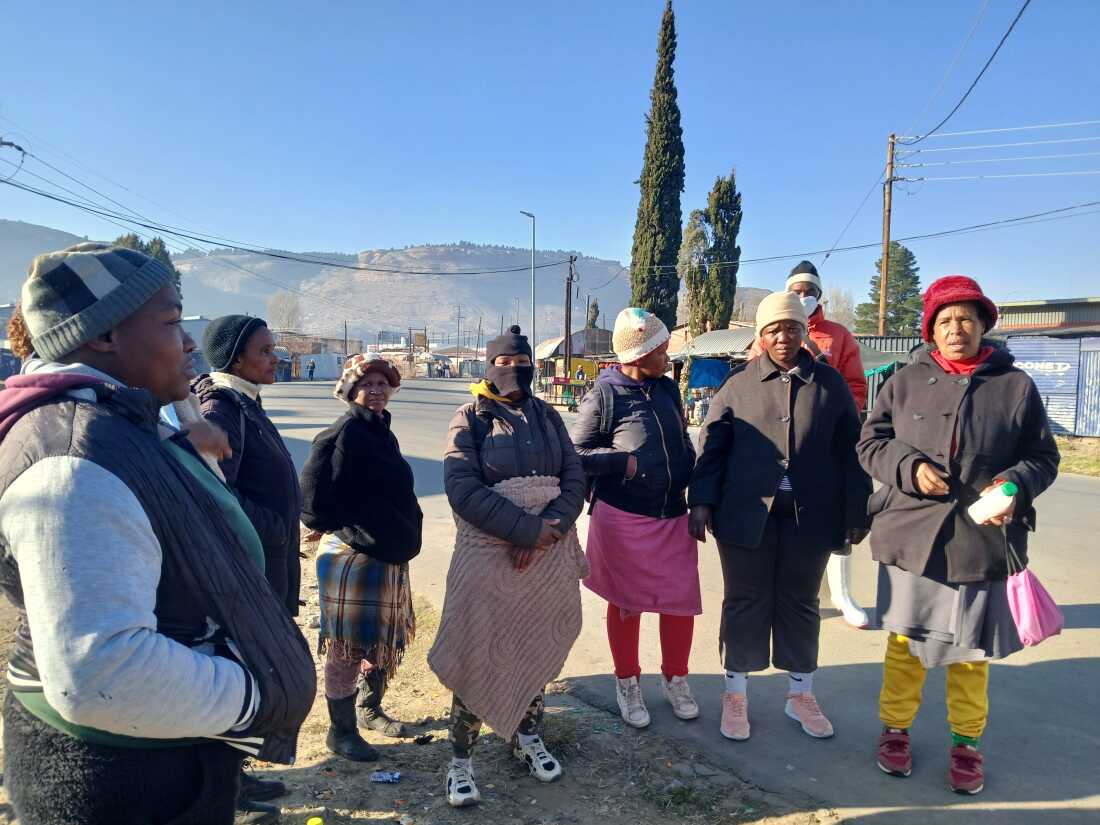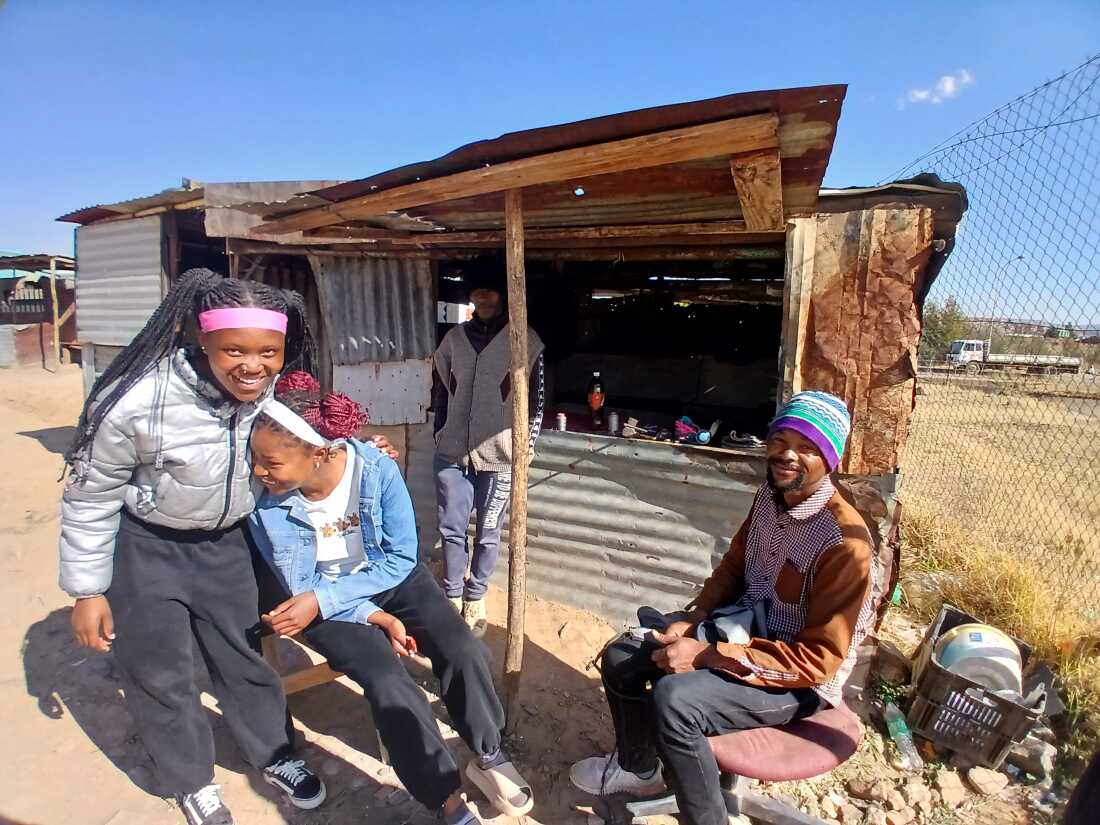An outline of textile factories on July 5, 2025 in Ha Thetsane Industrial Space in Maseru, Lesotho. The tiny mountain kingdom has round 35,000 garment staff and lots of of them face an unsure future.
Per-Anders Pettersson/Getty Photos Europe
disguise caption
toggle caption
Per-Anders Pettersson/Getty Photos Europe
MASERU, Lesotho —Crowds of ladies, bundled up in wooly hats and mittens towards the sharp winter chill, wait each morning on the gates of a garment manufacturing facility in Lesotho’s capital, hoping that a couple of amongst them shall be referred to as in to work a shift.
However no-one comes out and the manufacturing facility gates – which bear the identify of the Taiwanese firm that runs it in crimson Chinese language lettering – stay firmly shut.
It is one of many few factories in what was referred to as “the Denim Capital of Africa” that is nonetheless working after U.S. President Donald Trump introduced in April he was slapping the impoverished nation with the very best tariffs on this planet.
Many others have been compelled to shut down, with patrons spooked by the 50 p.c tariff announcement though they have been paused, for now.
With the economic system shortly unravelling the federal government declared a two-year nationwide state of catastrophe in early July hoping to unlock funding to create jobs. However the problem is immense and many individuals are already determined.
Maqajela Hlaatsane, 54, has been working in Maseru’s garment trade for many years – a job that is allowed her to boost her kids on her personal. Like many right here she’s a single mom who has been empowered by becoming a member of the workforce.
Now she’s unemployed and hungry, she says, pointing to the water bottle she carries round ingesting to attempt to trick herself into feeling full. What meals she has she’s saving for her household.
“I’m here looking for a job,” she says, standing on the road within the garment district the place the scent of sewage fills the air. “My family can’t survive on water alone.”
Like many trying to find work, she’s unclear why the U.S.. imposed such huge tariffs on her desperately poor nation, however all of them hold repeating one identify: “Trump, Trump, Trump.”
Commerce Imbalance
The U.S. chief says he imposed the tariffs in April due to a commerce imbalance between the 2 international locations. Final yr, the tiny mountain Kingdom surrounded totally by South Africa exported $237 million in items to the US – largely clothes– whereas the US exported simply $3 million to Lesotho.

Girls wait in line for work outdoors a garment manufacturing facility in Maseru, Lesotho. Work right here has dried up as the specter of Trump’s tariffs have hit a as soon as thriving trade onerous.
Kate Bartlett/NPR
disguise caption
toggle caption
Kate Bartlett/NPR

Girls wait in line for work outdoors a garment manufacturing facility in Maseru, Lesotho. Work right here has dried up as the specter of Trump’s tariffs have hit a as soon as thriving trade onerous.
Kate Bartlett/NPR
However Lesotho’s authorities argues it is a signal {that a} key U.S. coverage launched underneath former President George Bush has been working precisely as supposed. The African Development and Alternative Act (AGOA) permits some international locations on the continent tariff-free entry to the U.S. market.
Lesotho made probably the most of it, and shortly Taiwanese firms have been establishing factories in Maseru, producing t-shirts, sportswear and different attire for giant American manufacturers like Levi, Wrangler and Walmart.
African leaders are nervous as a result of Congress shall be deciding on whether or not to resume 25-year-old AGOA in September, however Lesotho’s Commerce Minister Mokhethi Shelile says it is already principally useless.
“AGOA, in effect it’s already sort of been scrapped with the tariffs,” he instructed NPR in his workplace in an unassuming outdated constructing in Maseru’s small, dusty CBD.
“It’s good value chain and if you cut it, it will surely hit even the U.S. itself,” stated the minister, including that the commerce imbalance Trump objects to is as a result of Lesotho merely cannot afford many U.S. merchandise.

Maqajela Hlaatsane, far proper, talks to different ladies searching for work outdoors a garment manufacturing facility in Maseru, Lesotho, on July 15, 2025.
Kate Bartlett/NPR
disguise caption
toggle caption
Kate Bartlett/NPR
“It was a good policy that has given livelihoods for people here and I want to believe some people are benefiting in the U.S. as well,” he stated, additionally noting that the federal government lately gave Elon Musk’s Starlink satellite tv for pc service a license to function within the nation.
One other manufacturing facility sits throughout the street from the working manufacturing facility the place Hlaatsane and others are queuing for work. However its now stopped operations. Supervisor Restselisitsoe Moshoeshoe says it primarily exported athleisure put on to Walmart. However it closed a couple of weeks in the past and he is needed to ship 2,000 staff residence.
“We cannot get raw material, we cannot export…The orders have been stopped, because everybody doesn’t know what’s going to happen,” he says.
“People who were supplying us with orders were scared,” he explains, though the tariffs have been paused shortly after being introduced.
Levi’s and Vetkoek
Throughout city it is lunchtime on the Levi’s manufacturing facility.
Staff come out and eat their lunch underneath the clear blue skies, surrounded on all sides by mountains, some snowcapped. Mpolai Sementhe, tucking right into a lunchbox of pap, a mealie meal staple meals, has sewn the quintessential American denims for years. She’s by no means owned a pair although.

Garment manufacturing facility staff iron denims on July 3, 2025 in Maseru, Lesotho. The tiny nation is Africa’s denim hub, now threatened by Trumps tariffs.
Per-Anders Pettersson/Getty Photos Europe
disguise caption
toggle caption
Per-Anders Pettersson/Getty Photos Europe
The denims made in Lesotho aren’t supposed for the native market – mockingly, individuals have to purchase them again second-hand. The markets listed below are stuffed with distributors promoting the West’s discarded clothes.
One other Levi’s employee, Makuotso Sebatane, stated whereas she’s undecided why the U.S. has imposed these tariffs on Lesotho, she thinks perhaps it is as a result of Trump stated “no-one knows where Lesotho is.” He made the feedback earlier this yr, when explaining his USAID cuts to Congress.
A Taiwanese supervisor who comes out the manufacturing facility gates, however would not wish to be named as a result of he is not licensed to talk for the manufacturing facility, tells NPR he too is nervous for the trade right here.
Quite a lot of cottage industries in makeshift tin shacks have sprung up on a area subsequent to the Levi’s manufacturing facility. In a single, with nation and western music blaring from the radio, cobbler Tumelo Rakoti, 34, fixes staff’ footwear. However he says enterprise is sluggish nowadays as no-one desires to spend cash throughout such unsure occasions.
The commerce minister says 12,000 garment staff stand to lose their jobs due to Trump’s tariffs, however that is not all – and Lesotho already has 49 p.c youth unemployment.
“The spillover effects, it’s around 40,000 – those are people who are going to be touched one way or another,” Minister Shelile instructed NPR. Folks just like the cobbler, the taxi drivers who take the employees to and from the factories, and others.
Close to the cobbler’s shack, two teenage women run a tuckshop promoting vetkoek, a deep-fried bread. Their enterprise can also be struggling for the reason that garment staff began purse-tightening.
Ntsoaki Heqoa, 19, says she’s typically seen Trump on TV and used to love him, however since he focused Lesotho with the tariffs she’s modified her thoughts.
She appeals to his transactional-style of politics, saying if she might communicate to the U.S. chief, she’d say: “President Trump, if only you knew how many of us depend on America…can we offer him something to stop whatever he’s doing?”
Her buddy and fellow tuckshop employee Mapaseka Mohale says merely that she’d inform Trump: “We are going to die, because we don’t have food, we depend on factories.”
‘Brief time’ and Trump shirts
In one other Maseru district, Treasured Clothes – which produces Trump-branded golf shirts – is among the many factories nonetheless working, although it isn’t clear for a way for much longer. Staff have been instructed it too might fold in September.

Tuckshop staff Ntsoaki Neqoa, middle, and Mapaseka Mohale, left joke with cobbler Tumelo Rakoti at a market close to the Levi’s Denims manufacturing facility in Maseru, Lesotho, on 15 July, 2025.
Kate Bartlett/NPR
disguise caption
toggle caption
Kate Bartlett/NPR
It is the tip of the day and throngs of ladies chat and chortle as they head for residence, some wrapped in conventional Lesotho blankets, their breath seen within the chilly winter air.
Maboitumelo Ramakatane, 48, has been stitching golf shirts at Treasured Clothes for 18 years. Does she know who wears them? After all, she says, the U.S. president.
She says she discovered the work onerous at first, however has mastered it. “I do it perfectly,” she says beaming. “I’m proud of my work….It’s supported my family. It’s an achievement to me.”
Her kids have all graduated highschool now, she says, and he or she hopes they’ll have a greater life than she’s had. She would not like them to work on the manufacturing facility ground like she does, but when they bought a managerial place, she says, that might be okay. However now Ramakatane is nervous in regards to the dreaded “short time.”
That is what staff right here name being placed on part-time work. Since Trump’s tariffs announcement, Ramakatane is already solely working two weeks out of each month and incomes half her wage – about $80 a month now.
She additionally notes that many ladies working within the factories have HIV – in a rustic with excessive charges of an infection. The US authorities by way of USAID have been supplying the nation with anti-retrovirals.
There was a lot of tents arrange close to the factories, the place staff might go to get examined and get entry to different providers like contraceptives. One, with Pepfar signage outdoors, continues to be working however the native NGO employee inside, who would not wish to be named for worry of shedding his job, tells NPR all of the nurses have been despatched residence after Trump’s USAID cuts. Now all he can do is give out self-testing kits for HIV. There are not any contraceptives anymore, or HIV-prevention injections referred to as PrEP, he says.
Ramakatane is nervous individuals might die: from lack of work, starvation, or HIV. And if she loses her job totally, Ramakatane says, she would not know what she’ll do.
“We are on our knees, we are on our knees…now our hope is only to God, to change Donald Trump’s mind,” she says.





